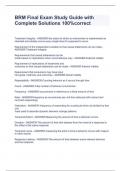Exam (elaborations)
BRM Final Exam Study Guide with Complete Solutions 100%correct
- Course
- Institution
BRM Final Exam Study Guide with Complete Solutions 100%correct BRM Final Exam Study Guide with Complete Solutions 100%correct BRM Final Exam Study Guide with Complete Solutions 100%correct BRM Final Exam Study Guide with Complete Solutions 100%correct BRM Final Exam Study Guide ...
[Show more]



